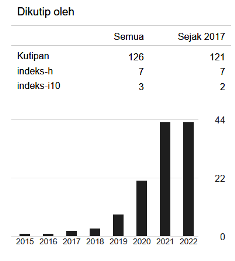KAMPANYE NILAI-NILAI WASATHIYAH KEPADA MASYARAKAT MELALUI PENGABDIAN SECARA VIRTUAL DI ERA NEW NORMAL
Abstract
This community service is carried out by presenting a new concept, namely virtual service from home as an effort to prevent Covid-19 and comply with government recommendations in implementing health protocols. Departing from anxiety and problems related to radicalism, SARA-ism, anarchism, to terrorism, this virtual service activity was carried out in order to campaign wasathiyah values by creating creative content: religious moderation videos, religious moderation posters, quotes, podcasts, and istighotsah (prayer together) virtually through social media Instagram, YouTube and Facebook. This virtual service activity received a very good response from the community, which indicates that this activity was successfully accepted and able to provide benefits to the community in order to foster a sense of unity and respect for differences.
Keywords
Full Text:
PDFReferences
Anwar, Saiful. (2017). Kejahatan Bertopeng Agama: Sebuah Tinjauan Sosiologi Agama. Jurnal Pendidikan Islam, Vol. 4 (2) hlm. 252-263.
Arifinsyah, dkk. (2020). The Urgency of Religious Moderation in Preventing Radicalism in Indonesia. ESSENSIA: Jurnal Ilmu Ilmu Ushuluddin, Vol. 21 (1) hlm. 91-107.
Fahri, Mohamad dan Zainuri, Ahmad. (2019). Moderasi Beragama di Indonesia. Intizar, Vol.25 (2): 1.
Hanafi, Mohd Shukri. (2014). The Wasatiyyah (Moderation) Concept in Islamic Epistemology: A Case Study its Implementation in Malaysia. International Journal Of Humanities and Sosial Science, Vol. 4 (9), page. 51-62.
Handoko, Agus. (2019). Analisis Kejahatan Terorisme Berkedok Agama (Analysis of Terrorism Crimes Impersonating Religion). SALAM; Jurnal Sosial & Budaya Syar-i, Vol. 6 (2), hlm.155-178.
Haryono, Endi. (2010). Kebijakan Anti-Terorisme Indonesia: Dilema Demokrasi dan Represi. Jurnal Ilmu Sosial dan Ilmu Politik, Vol. 14 (2), hlm. 229-246.
Izzan, Ahmad. (2015). Mutiara Kearifan. Bandung: Tafakur Kelompok Humaniora.
Junaid, Hamzah. (2013). Pergerakan Kelompok Terorisme dalam Perspektif Barat dan Islam. Jurnal Wawasan Keisalaman, Vol.2 (8), hlm.118-135.
Peranginangin, Yahya. (2008). Berkreasi Tanpa Batas dengan iLife’08. Jakarta: PT Elex Media Komputindo.
Riyana, Cheppy. (2007). Pedoman Pengembangan Media Video. Jakarta: P3AIUPI.
Shelly, dkk. (2007). Discovering Computers: Menjelajah Dunia Komputer Fundamental. Jakarta: Salemba Infotek.
Woodward, Scoot and Royce Kimmons. (2018.) Religious Implications of Social Media in Education. Journal Religion & Education, Vol 46 (2), page. 271-293.
Refbacks
- There are currently no refbacks.
Copyright (c) 2021 Turast: Jurnal Penelitian dan Pengabdian

This work is licensed under a Creative Commons Attribution-ShareAlike 4.0 International License.

This work is licensed under a Creative Commons Attribution-ShareAlike 4.0 International License
Turast: Jurnal Penelitian dan Pengabdian
Lembaga Penelitian dan Pengabdian (LPPM), Gedung Rektorat Lantai I
Kampus III Universitas Islam Negeri Imam Bonjol Padang - All rights reserved
Email: turast@uinib.ac.id



